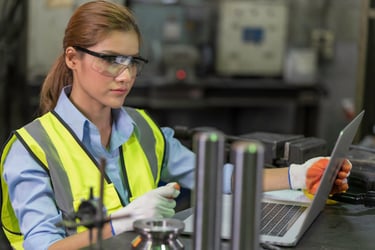Becoming a Life Science Recruiting Subject Matter Expert
The need for specialized expertise increases as the life science industry continues to evolve. Your...

 Validation engineers play a critical role in product development. They are the unsung heroes that ensure every product meets it’s intended function and is safe for use. Take insulin pens for example, validation engineers ensure a reliable product for patients with diabetes by executing rigorous tests outlined by regulatory agencies. A validation engineer's presence ensures comprehensive assurance, meeting high standards and mitigating risks in products, equipment, processes, and facilities. Let’s explore their varying impact for three key sectors in life sciences: pharmaceuticals, biotechnology, and medical devices.
Validation engineers play a critical role in product development. They are the unsung heroes that ensure every product meets it’s intended function and is safe for use. Take insulin pens for example, validation engineers ensure a reliable product for patients with diabetes by executing rigorous tests outlined by regulatory agencies. A validation engineer's presence ensures comprehensive assurance, meeting high standards and mitigating risks in products, equipment, processes, and facilities. Let’s explore their varying impact for three key sectors in life sciences: pharmaceuticals, biotechnology, and medical devices.
Validation engineers typically follow a three-step process to ensure that the equipment is installed and operated according to the manufacturer's specified guidelines. The steps are as follows - Installation Qualification (IQ), Operational Qualification (OQ), and Performance Qualification (PQ). Each step serves a distinct purpose - guaranteeing safe operation and reliable results across all three sectors. Let's examine the role of each step.
Verifies whether equipment is correctly assembled, following the manufacturer's specifications and requirements for installation.
Ensures equipment operates within the specified manufacturer's operating ranges.
Validates stability over time, signifying that all equipment and instruments must demonstrate their capability to consistently generate reproducible results.
Validation engineers in the pharmaceutical sector typically work within the regulatory frameworks established by agencies such as the Food and Drug Administration (FDA) in the United States or the European Medicines Agency (EMA) in Europe. They focus on validating processes and systems related to drug development, manufacturing, and distribution.
Pharmaceuticals typically involve chemical compounds formulated into drugs. Validation engineers focus on ensuring the quality, purity, potency, and stability of these drug products.
Pharmaceutical manufacturing processes typically involve chemical synthesis, formulation, and packaging. Validation engineers validate equipment, processes, and facilities used in drug manufacturing.
Validation engineers in the biotech industry also comply with regulations from agencies such as the FDA or EMA, but they may deal with additional regulations specific to biotechnology products, such as those related to recombinant DNA technology or gene therapy.
Biotech products, such as biologics, gene therapies, and cell therapies, tend to be more complex than traditional pharmaceuticals or medical devices. Validation engineers in the biotech industry may need to validate innovative processes involving genetic engineering, cell culture, and fermentation.
Biotech manufacturing processes often involve advanced technologies such as cell culture, fermentation, and genetic engineering. Validation engineers in biotech validate equipment, processes, and facilities used in the production of biotechnology products.
In the medical device industry, validation engineers adhere to regulations set forth by agencies such as the FDA's Center for Devices and Radiological Health (CDRH) or the European Union Medical Device Regulation (MDR). They validate processes and systems related to the design, manufacturing, packaging, and distribution of medical devices.
Medical devices range from simple tools to complex electronic devices. Validation engineers in this industry validate the design, manufacturing processes, and functionality of medical devices to ensure safety and efficacy.
Medical device manufacturing processes may involve materials processing, machining, assembly, and sterilization. Validation engineers validate equipment, processes, and facilities used in medical device manufacturing.
Validation engineers are vital in ensuring the safety and functionality of products in the pharmaceutical, biotech, and medical device sectors. The absence of a validation engineer can lead to detrimental consequences such as lost sales, legal liabilities, and, in extreme cases, severe injury or loss of life. That's why it is critical for life science companies to prioritize the inclusion of validation engineers in their product development processes, ensuring not only regulatory compliance but also safeguarding their reputation, customer trust, and the well-being of end-users. Reach out to us if you need help locating talent to ensure compliance with regulatory frameworks.

The need for specialized expertise increases as the life science industry continues to evolve. Your...
June 06, 2023

"We can do that!” is a phrase staffing firms commonly use when trying to secure the business of a...
July 07, 2020

Los Angeles is a key destination for the cosmetics industry, home to some of the most innovative...
October 03, 2024